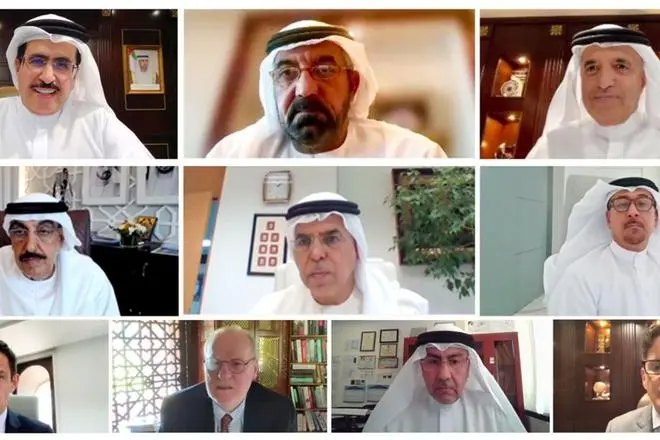PHOTO
H.H. Sheikh Ahmed bin Saeed Al Maktoum, Chairman of the Dubai Supreme Council of Energy (DSCE), chaired the 83rd meeting of the Council, which was held virtually in the presence of Saeed Mohammed Al Tayer, Vice Chairman of the DSCE.
The meeting was also attended by Ahmed Buti Al Muhairbi, Secretary-General of the Dubai Supreme Council of Energy, and board members Dawood Al Hajri, Director-General of Dubai Municipality; Abdulla bin Kalban, Managing Director of Emirates Global Aluminium (EGA); Saif Humaid Al Falasi, CEO of Emirates National Oil Company (ENOC); and Juan-Pablo Freile, General Manager of Dubai Petroleum.
During the meeting, the Council reviewed the semi-annual evaluation of the programmes and projects aimed at achieving sustainable development through renewable and clean energy projects and the transition to a green economy. These initiatives are aligned with the Demand Side Management Strategy, which aims to consolidate Dubai’s position as a global benchmark for water and energy efficiency to achieve savings of at least 30 percent by 2030 and 50 percent by 2050 compared to business as usual in electricity and water use.
Over the past five years, qualitative projects have focused on increasing electricity production from solar energy, reducing water and electricity consumption, increasing the number of electric vehicle charging stations, reusing wastewater, and reducing carbon emissions.
As a result of these programmes, Dubai achieved significant reductions in electricity and water use in 2023 compared to business-as-usual scenario. Last year, Dubai reduced electricity consumption by 15.9 percent, equivalent to 9.7 terawatt hours, and water consumption by 12.4 percent, equivalent to 18.8 billion imperial gallons (BIG). These savings are equal to approximately AED 14.6 billion in financial terms.
“In line with the vision and directives of His Highness Sheikh Mohammed bin Rashid Al Maktoum, Vice President, Prime Minister and Ruler of Dubai, we are steadily progressing in implementing the Dubai Clean Energy Strategy 2050 and the Dubai Net Zero Carbon Emissions Strategy 2050 to provide 100% of the energy production capacity from clean energy sources by 2050. The aim is to enhance Dubai’s competitiveness, ensure the prosperity and quality of life for citizens, residents and visitors, as well as consolidate the Emirate’s position as a global hub for green economy. The Council regularly evaluates existing and planned projects to keep pace with Dubai’s prosperous growth by adopting the principles of circular economy and reducing energy and water consumption,” said Saeed Mohammed Al Tayer, Vice Chairman of DSCE.
“Over the past years, the Council has been keen to establish implementation mechanisms for major programmes and projects supported by policies and strategies that achieve the desired goals of creating a strong local economy and society. This supports the transition to a green economy and ensures sustainable energy for generations to come,” added Ahmed Buti Al Muhairbi, Secretary-General of DSCE.





















